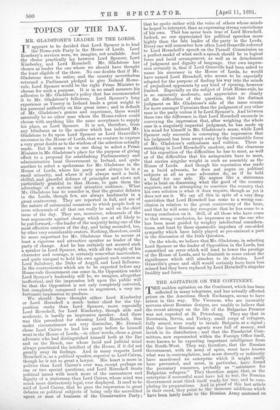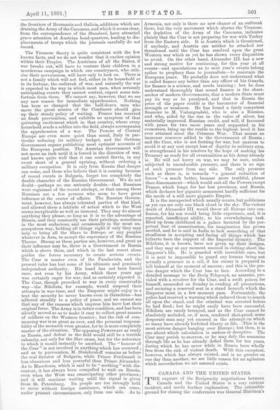THE AGITATION ON THE CONTINENT.
MHE sudden agitation on the Continent, which has been reflected in many telegrams, and has actually affected prices on the American Stock Exchanges, seems to have arisen in this way. The Viennese, who are incurably nervous about Russian designs, are unable to believe that the recent attempt on the life of the Bulgarian Premier was not expected at St. Petersburg. They say that in Roumania, Servia, and Turkey, small corps of refugees, fully armed, were ready to invade Bulgaria at a signal ; that the lesser Russian agents were full of money, and lavish in its distribution ; and that the Panslavist Com- mittees, now represented within the Foreign Office itself, were known to be expecting important intelligence from the South-West. They say, therefore, that the Russian Government, with its army of spies, must have known what was in contemplation, and must directly or indirectly have sanctioned an enterprise which it might easily have prevented, and must, in particular, have found the pecuniary resources, probably as " ashistance for Bulgarian refugees." They therefore argue that, as the enterprise if successful must have led to war, the Russian Government must think itself ready for war,. and be com- pleting its preparations. And in proof of this last article i in their creed, they point to the immense additions which have been lately made to the Russian Army eantoned on the frontiers of Roumania and Galicia, additions which are draining the Army of the Caucasus, and which it seems clear, from the correspondence of the Standard, have attracted grave attention at Austrian head-quarters, leading to dis- placements of troops which the journals carefully do not record.
The Viennese theory is quite consistent with the few known facts, and we do not wonder that it excites opinion within their Empire. The Austrians of all the States, if war breaks out, will have to venture their children in a murderous campaign in which our countrymen, who criti- cise their nervousness, will have only to look on. There is not a family which will not feel, either in its household or in its fortune, the outbreak of war, and naturally the war is expected in the way in which most men, when seriously anticipating events they cannot control, expect some mis- fortune from them. We cannot say, however, that we see any new reason for immediate apprehension. Nothing has been so changed that the half-dozen men who move the great armies of the Continent should give up their steady policy of waiting. France has received no fresh provocation, and exhibits no symptom of that quivering excitement which in that country, where every household sends a soldier into the field, always accompanies the apprehension of a war. The Powers of Central Europe are even more quiet than usual, Italy in par- ticular reducing its military budget, and the German Government organs publishing most optimist accounts of the European position. The Austrian Government will not move an inch until it is forced in the direction of war, and knows quite well that it can control Servia, in any event short of a general uprising, without ordering a military occupation. It is only from Russia that danger can come, and those who believe that it is coming because of recent events in Bulgaria, forget too completely the double character of the Russian Government. We do not doubt—perhaps no one seriously doubts—that Russians were cognisant of the recent attempt, or that among those Russians are a few persons who seem to have great influence at the centre of affairs. The Russian Govern- ment, however, has always tolerated parties of that kind, and allowed them a latitude of action which to the West seems inexplicable as well as immoral. They may do almost anything they please, so long as it is to the advantage of Russia, and they constantly use their privilege, sometimes in the most audacious, and occasionally in the most un- scrupulous way, holding all things right if only they may help to bring all the Slays in Europe, or any peoples whatever in Asia, to accept the supremacy of the Russian Throne. Strong as these parties are, however, and great as their influence may be, there is a Government in Russia which is above them, and, which in the last resort alone guides the forces necessary to create serious events. The Czar is master even of the Panslavists, and the present ruler has lost none of his ultimate and genuinely independent authority. His hand has not been forced once, not even by his Army, which three years ago was certainly eager for war, and as certainly expected it. The Czar, though provoked to war in every conceivable way—the Nihilists, for example, would suspend their attempts in war-time, and the Emperor might enjoy in a tent the security he never knows even in Gatschina—has adhered steadily to a policy of peace, and we cannot see that any of the reasons which impress him have lost their original force. The Army is in better condition, and has been silently moved so as to make it easy to collect great masses of soldiers on the Western frontier ; but the risk of coin- mencing war is as great as ever, and the personal responsi- bility of the monarch even greater, for he is more completely master of the situation. The opposing Powers are as ready as Russia, and defeat in the field would still be a terrible calamity, not only for the Slav cause, but for the autocracy to which it would instantly be ascribed. The "honour of the Czar" is not involved in anything which has occurred ; and as to provocation, M. Stambouloff remains as before the real dictator of Bulgaria, while Prince Ferdinand is less obnoxious and less powerful than Prince Alexander. As to Macedonia, which is said to be " seething " with dis- content, it has always been compelled to wait on Russia, even when the West was emancipating other provinces ; and it will continue waiting until the signal is given from St. Petersburg. Its people are too strongly held to move without foreign assistance, which can come, under present circumstances, only from one side. As to Armenia, not only is there no new chance of an outbreak there, but the very movement which alarms the Viennese, the depletion of the Army of the Caucasus, indicates plainly that the Czar is not preparing for war with Turkey from the Eastern side. It is Austria which is threatened, if anybody, and Austria can neither be attacked nor threatened until the Czar has resolved upon the great Western war which as yet he has shown every disposition to avoid. On the other hand, Alexander LII. has a new and strong motive for continuing, for this year at all events—and speculations as to next year's events belong rather to prophecy than to journalism—to maintain the European peace. He probably does not understand what is called finance any better than any officer of his Guards, for finance is a science, and needs training ; but he does understand thoroughly that sound finance is the sheet- anchor of modern Governments, that a modern State must pay its way or be paralysed, and that in Russia the price of the paper rouble is the barometer of financial strength or weakness. He has found a fairly competent financier in M. Vishnigradski, who is also a Russian, and who, aided by the rise in the value of silver, has materially improved Russian credit, and will, if favoured with peace for two more years and supported in his economies, bring up the rouble to the highest level it has ever attained since the Crimean War. That means an. immense resource added to the Government of Russia ; and the Czar, who is not fretting for war, but anxious to avoid it at any cost except loss of dignity in military eyes, is strengthened in his resolves by the hope of making his Treasury as ready for all eventualities as his Army already is. He will not hurry on war, we may be sure, unless subjected to unendurable pressure, and there is no sign of such pressure from any side. The only pressure such as there is, is towards "a general reduction of forces "—a much better, because more truthful, phrase than disarmament—which would suit all the Powers except France, which longs for her lost provinces, and Russia, which declares her gigantic armament hardly sufficient for the needs of a still more gigantic Empire.
It is the unexpected which usually occurs, but politicians as yet can see only one black cloud in the sky. The violent death of Alexander hI, would throw all Europe into con- fusion, for his son would bring little experience, and, it is reported, insufficient ability, to his overwhelming task. Bred up from childhood in a palace haunted by the per- petual fear of assassination, his imagination has grown morbid, d, and he is said in India to lack something of that steadiness n accepting and facing all things which has hitherto been the support of the Imperial dynasty. The Nihilists, it is known, have not given up their designs, and they may at any moment succeed in cutting short the Emperor's life. He is guarded with incredible care, but it is next to impossible to guard, any human being not actually a prisoner in a cell, if his enemy is prepared to kill himself at the moment of success; and this is the pre- cise danger which the Czar has to face. According to a detailed message to the Daily Telegraph, an assassin, pro- vided with a revolver for the Czar, and a swift poison for himself, succeeded on Sunday in evading all precautions, and securing a reserved seat in a stand beneath which the Emperor must in a few moment pass. Fortunately, the police had received a warning which induced them to search all upon the stand, and the criminal was arrested before he had fired ; but he might easily have been successful. Nihilists are rarely betrayed, and as the Czar cannot be absolutely secluded, or, if seen, rendered shot-proof, some desperate man may yet succeed in the attempt on which so many have already forfeited liberty or life. This is the most serious danger hanging over Europe; but then, it is one about which calculation is useless or deceptive. The Czar may perish to-morrow, or he may defy the assassins through life as he has already defied them for ten years, during which he has never while in Russia been wholly free from the risk of violent death. With this exception, however, which has always existed, and is no greater on one day than another, we see little reason for an agitation which nevertheless we are assured exists.



































 Previous page
Previous page